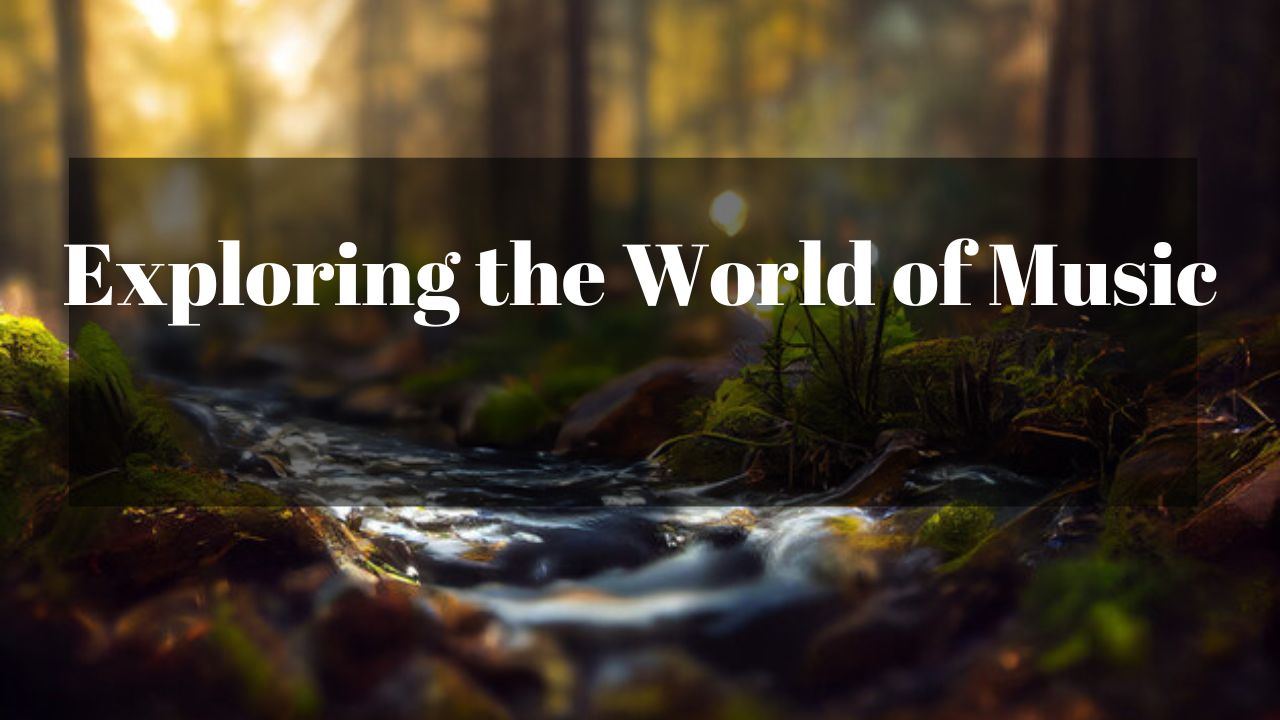Exploring the World of Music
Music is a universal language that transcends borders, cultures, and generations. From the rhythmic beats of African drums to the intricate melodies of classical orchestras, the world of music is a vast and diverse landscape waiting to be explored. In this article, we embark on a harmonious journey across genres and cultures, delving into the rich tapestry of musical expression that shapes our global heritage.
The Universal Language of Music:
Music is often described as the universal language, capable of conveying emotions and stories without the need for words. Regardless of cultural background or native language, people from all corners of the globe can connect through the power of music. It serves as a profound expression of human experiences, emotions, and creativity.
Diverse Genres: A Musical Kaleidoscope:
One of the wonders of the musical world is its vast array of genres, each with its unique characteristics and influences. From the soulful blues of the Mississippi Delta to the energetic rhythms of reggae in Jamaica, exploring different genres opens doors to diverse cultures, histories, and artistic expressions.
-
Classical Music: A Timeless Symphony:
Classical music, with its intricate compositions and timeless melodies, represents a rich heritage that spans centuries. Composers like Mozart, Beethoven, and Bach have left an indelible mark on the world, and orchestras continue to interpret their masterpieces, preserving the elegance and complexity of classical music.
-
Jazz: Improvisation and Innovation:
Born in the vibrant streets of New Orleans, jazz is a genre celebrated for its improvisational nature and ability to blend diverse musical elements. From the swing era of the 1930s to the avant-garde explorations of the present, jazz remains a dynamic and ever-evolving genre.
-
Rock and Roll: The Soundtrack of Rebellion:
Rock and roll emerged as a rebellious force in the mid-20th century, challenging societal norms and capturing the spirit of youth. With icons like Elvis Presley, The Beatles, and Jimi Hendrix leading the way, rock became a global phenomenon, influencing fashion, culture, and attitudes.
-
Hip-Hop: Rhymes and Beats of Urban Culture:
Hip-hop, born in the Bronx in the 1970s, is more than a musical genre; it’s a cultural movement that encompasses music, dance, art, and social activism. From the gritty narratives of street life to the poetic rhymes of conscious rap, hip-hop has become a powerful voice for marginalized communities.
- World Music: Global Fusion of Sounds:
World music is an umbrella term that encompasses a vast array of traditional and contemporary sounds from around the world. From the mesmerizing sitar melodies of Indian classical music to the infectious rhythms of Afrobeat, world music offers a journey across continents and cultures.
Cultural Influences: A Symphony of Diversity:
Music is deeply intertwined with culture, reflecting the beliefs, traditions, and values of communities. Exploring the world of music provides a unique opportunity to delve into the rich tapestry of diverse cultures, each contributing its unique flavor to the global symphony.
- African Rhythms: Beats That Resonate:
The heartbeat of African music lies in its rhythmic complexity and vibrant percussion. From the West African djembe to the East African drum ensembles, the continent’s music is a celebration of community, spirituality, and storytelling.
- Latin American Passion: Salsa, Tango, and More:
Latin American music is a fiery blend of passion and rhythm. From the sultry movements of the Argentine tango to the infectious beats of salsa and merengue, the music of Latin America is a testament to the region’s rich cultural heritage.
- Asian Harmonies: Sitar, Koto, and Beyond:
Asia’s musical traditions are as diverse as its landscapes. The sitar in India, the koto in Japan, and the erhu in China are just a few examples of the instruments that contribute to the rich tapestry of Asian music. These traditions often reflect ancient philosophies, religious practices, and storytelling.
- European Classical Legacy: A Storied Tradition:
The classical music traditions of Europe have left an indelible mark on the global musical landscape. From the grandeur of symphonies to the delicate nuances of chamber music, European classical traditions have set the standard for musical excellence.
The Impact of Technology: A Digital Symphony:
In the 21st century, technology has revolutionized the way we create, consume, and share music. Digital platforms, streaming services, and innovative production tools have democratized access to music, allowing artists from diverse backgrounds to reach global audiences. The intersection of technology and music has given rise to new genres, collaborations, and ways of experiencing this art form.
Musical Expressions of Identity:
Music serves as a powerful form of identity expression. Whether through folk songs that capture the essence of a community’s history or protest anthems that give voice to social movements, music has the ability to reflect and shape collective identities. Exploring these musical expressions provides insight into the soul of communities and the human experience.
The Transformative Power of Music: Healing and Connection:
Beyond its role as entertainment, music possesses a transformative power. It has been used for centuries as a form of therapy, providing solace, healing, and connection. Music therapy is employed to support individuals dealing with mental health challenges, trauma, and various forms of distress.
Educational Value of Music: Nurturing Young Minds:
The study of music has proven benefits for cognitive development, emotional intelligence, and academic achievement. Learning to play an instrument, understanding musical theory, and engaging in creative expression through music contribute to a well-rounded education. Many cultures recognize the importance of music education in shaping the minds of future generations.
The Future of Music: Innovation and Evolution:
As we step into the future, the world of music continues to evolve. Innovations in music production, virtual reality experiences, and interactive performances redefine how we engage with this art form. Emerging artists push boundaries and explore new sonic territories, ensuring that the world of music remains a dynamic and ever-changing landscape.
Conclusion:
Exploring the world of music is a journey that invites us to embrace the diversity of human expression, connect with cultures far and wide, and appreciate the beauty of creative innovation. From the traditional sounds that echo through centuries to the cutting-edge beats of contemporary genres, music is a force that unites us in our shared humanity. So, tune in, turn up the volume, and let the world of music take you on a harmonious journey across genres, cultures, and the boundless landscapes of the human soul.











